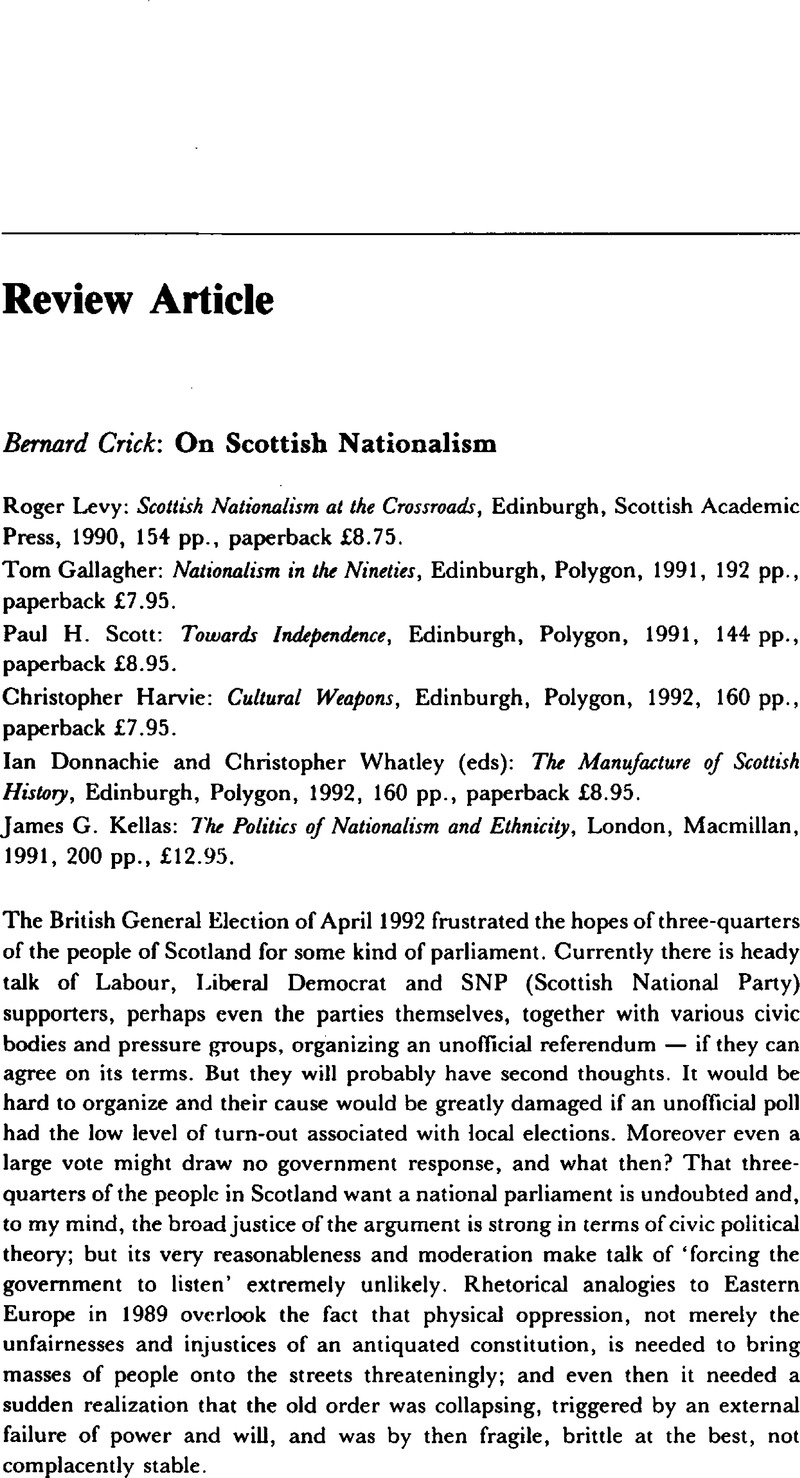Article contents
Abstract

- Type
- Review Article
- Information
- Copyright
- Copyright © Government and Opposition Ltd 1992
References
1 The implication is there and now grows fast. Mr Alistair Darling, MP for Edinburgh Central, was an opposition spokesman on constitutional affairs in the last Parliament and strongly defended Roy Hattersley’s view that ‘the sovereignty of Parliament’ was the good key to the whole British system, and would be threatened by proposals for entrenchment and judicial review. But he is now reported to be considering seriously proposals for a United Kingdom federalism. And see James Kellas, ‘The Scottish Constitutional Convention’, The Scoffish Covmmmf Year Book, 1992, ed. Lindsay Patterson and David McCrone, Edinburgh University; and this author’s ‘the Sovereignty of Parliament and the Irish Question’ in his Political Thoughts und Polemics, Edinburgh University Press, 1990, suggests that recognition of the difficulty of governing the other nations led the English in the past to a prudential way or exercising sovereignty as if in a federal state.
2 Towards Scotland's Parliament: a Report to the Scottish People by the Scottish Constitutional Convention, Edinburgh, 30 Nov. 1990, Rosebery House EH12. And see James Kellas, Scottish Government Yearbook 1992, op. cit. (These Yearbooks are an invaluable source on recent Scottish politics; they are about to become a quarterly journal of analysis and record, Scottish Affairs). James Naughtie's ‘Labour 1979–88’ is a good overall account of Labour's changes, in Donnachie, Ian, Harvie, Christopher and Wood, Ian S. (eds), Forward Labour Politics in Scotland 1888–1980, Edinburgh, Polygon, 1989.Google Scholar
3 Edinburgh, July 1988, Campaign for a Scottish Assembly. And A Claim of Right for Scotland is reprinted in a useful volume of essays of the same title, edited by Owen Dudley Edwards, Edinburgh University Press, 1988.
4 See Miller, William, ‘Can We Believe in Opinion Polls?’ in McCrone, David (ed.), What Scotland Wants. Unit for the Study of Government in Scotland, 1990.Google Scholar
5 So did I. Why else throw so much good time away on writing, with Millar, David, Standing Orden for the Parliament of Scotland, Edinburgh, John Wheatley Centre, 1991?Google Scholar
6 The distinctiveness is demonstrated beyond doubt in Miller, William, Thc End of British Politics: Scots and English Political Behaviour in the '70S, Oxford, Clarendon Press, 1981.Google Scholar But few English textbooks bother to include substantial sections on Scotland; they systematically confuse ‘English’ and ‘British’. See this author, ‘An Englishman Considers His Passport’, Irish Review, Autumn 1988.
7 See Kellner, Peter, ‘Why the Tories Won’ in The BBC‐Vacher's Guide to the New House of Commons, Vacher's, Berkhamstead, 1992, pp. 9–13 Google Scholar. He quotes figures on the constitutional question from an NOP Election Day poll, thus likely to get more realistic answers than in polls on that question alone. Nonetheless, Scottish voters went 9% for outright Independence; 19.5% for Independence inside EC; 44% for Devolution; 24% for No change, and only 3% Don't knows. And 17% of voters in England and Wales would support some Form of independence for Scotland; 36% Devolution, 24% No change and 17% Don't knows. Thus no real sign of English hostility despite some backbench Tory MPs beating Drake's drum loudly.
8 The Northern Ireland Constitution Act 1973 and the Inter‐Government Agreement of 1985 commit HMG to bring in legislation if a majority of the people on Northern Ireland ‘clearly wish for and formally consent to the establishment of a United Ireland’.
9 See Thomas, Dafydd Elis, ‘The Constitution of Wales’ in Crick, Bernard (ed), National Identities and the Constitution of the United Kingdom, Oxford, Blackwell and Political Quarterly, 1991.Google Scholar
10 See Pittock, Murray G. H., The Invention of Scotland: the Stuart Myth and the Scottish Identity, 1638 to the Present, London, Routledge, 1991 Google Scholar. And consider also two books whose authors, while strong nationalists and anti‐unionists, yet both attack the tartan myth and denounce the SNP for claiming a monopoly of patriotic virtue and for having no sensible idea of how their aspirations could become realizable policies: Neal Ascherson's Games with Shadows and Tom Nairn's The Enchanted Glass, both London, Century Hutchinson, 1988.
11 See especially Neil MacCormick, ‘Unrepentant Gradualism’ in Owen Dudley Edwards (ed), op. cit. and ‘Nations and Nationalism’ in his Legal Right and Social Democracy; Essays in Legal and Political Philosophy, Oxford, Clarendon Press, 1982.
12 Paul H. Scott, Towards Independence; Christopher Harvie, Cultural Weapons, and Ian Donnachie and Christopher Whatley, (eds), The Manufacture of Scottish History.
13 Dafydd clearly puts preservation of the language far above gaining a Welsh parliament. Indeed he sees clearly that a Welsh parliament would be a numerical threat to any hope of a genuine bilinguality in Wales, in B. Crick (ed.), National Identities, op. cit.
14 See this author's ‘The Sovereignty of Parliament and the Scottish Question’, in Lewis, Norman (ed.), Happy and Glorious; the Constitution in Transition, Milton Keynes, Open University Press, 1990.Google Scholar
- 1
- Cited by


